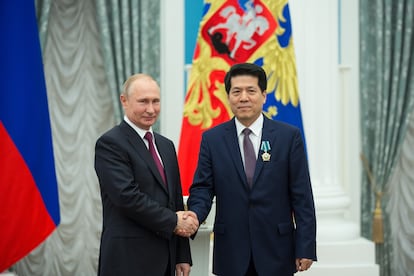China seeks to boost middleman status by sending special envoy to Kyiv and Moscow
Li Hui, who will next week travel to five European countries, will be the highest-ranking Chinese official to visit Ukraine since the Russian invasion began

As it attempts to act as a mediator over the war in Ukraine, China has confirmed that it will next week send a high-ranking Chinese official to visit the country for the first time since Russia invaded its neighbor in February 2022. Li Hui, the Chinese government’s special representative for Eurasian affairs — and the nation’s former ambassador in Moscow — will travel to Europe on Monday, on a trip that will take him to Russia, Ukraine, Poland, France and Germany. Li’s visit will allow “communication on a political settlement of the Ukraine crisis,” Chinese Foreign Ministry spokesperson Wang Wenbin said.
At the end of April, China announced its intention to send a special envoy to Europe, in a bid to “establish deep communication.” The move came after the Chinese president, Xi Jinping, held a telephone call with his Ukrainian counterpart, Volodymyr Zelenskiy, for the first and only time since the conflict broke out.
“This upcoming visit by the Chinese representative again reflects China’s commitment to promoting peace talks and staying on the side of peace,” Wang told his regular press briefing on Friday. “Since the beginning of the Ukraine crisis, China has held an objective and just position and actively promoted talks for peace.”
Western powers are not so sure about that. Beijing avoids calling the conflict a “war,” and hasn’t condemned the invasion. What’s more, Xi didn’t speak to Zelenskiy until a year and two months into the crisis, despite holding talks with Russian President Vladimir Putin on several occasions. Nevertheless, China has in recent months sought to put out the message that it has a key role to play in resolving geopolitical issues, presenting itself as an alternative to the global leadership of the United States.
In February, China unveiled a 12-point position paper — not a peace plan — aimed at reaching a “political resolution to the crisis.” The document was met with a lukewarm response in Washington and Brussels. However, the Spanish prime minister, Pedro Sánchez, the French president, Emmanuel Macron, and the president of the European Commission, Ursula von der Leyen, said during their recent visits to China that some elements of the paper are “interesting,” such as the “respect for territorial integrity” and its emphatic rejection of nuclear war.
“The voices for ceasefire and de-escalation are building in the international community,” Wang said on Friday. “China will continue to play a constructive role and build more international consensus on ending hostilities, starting peace talks and preventing escalation of the situation.”
Xi and Putin’s “no-limits friendship”
International analysts feel that Xi could be the only person capable of persuading Putin to bring an end to the war. The two “good old friends,” as the Russian defined their relationship during their most recent meeting, proclaimed a “no-limits friendship” days before the invasion of Ukraine began, and their countries maintain an important strategic partnership. However, the close ties between the nations have caused alarm bells to ring more than once in the West, over the possibility that Beijing could come to Moscow’s military assistance.
Against this backdrop, there is keen anticipation ahead of Li’s visit to Russia and Ukraine next week. The 70-year-old comes with deep experience of the modus operandi of Chinese diplomacy in recent decades. He was ambassador to Russia between 2009 and 2019, a post he was appointed to under former president Hu Jintao, before being kept on when Xi took over. A career diplomat, he belongs to a generation of Chinese people who were born at a time when their parents idolized the Soviet system; who grew up as Sino-Russian political relations began to deteriorate after the death of Stalin in 1953; and who then experienced the rapprochement between Moscow and Beijing as China sought to boost its exports, at a point when its status as the world’s premier exporter was still in the making.
Li was also the ambassador to Kazakhstan between 1997 and 2000. Despite his extensive knowledge of the nations that were part of the former Soviet Union, there may be misgivings in Kyiv over his impartiality: he has made his alignment with the Kremlin clear in several Russian and Chinese media outlets. In July 2019, as his stint as ambassador in Moscow came to an end, he penned a goodbye article for the Russian news agency TASS, entitled “Eternal friendship like evergreen mountains.” “Regardless of where I am or what post I hold,” he wrote, “I will devote myself, as ever, to the cause of Sino-Russian friendship and will continue using my 44 years of experience in diplomacy with Russia to contribute to the development of bilateral relations.”
Sign up for our weekly newsletter to get more English-language news coverage from EL PAÍS USA Edition
Tu suscripción se está usando en otro dispositivo
¿Quieres añadir otro usuario a tu suscripción?
Si continúas leyendo en este dispositivo, no se podrá leer en el otro.
FlechaTu suscripción se está usando en otro dispositivo y solo puedes acceder a EL PAÍS desde un dispositivo a la vez.
Si quieres compartir tu cuenta, cambia tu suscripción a la modalidad Premium, así podrás añadir otro usuario. Cada uno accederá con su propia cuenta de email, lo que os permitirá personalizar vuestra experiencia en EL PAÍS.
¿Tienes una suscripción de empresa? Accede aquí para contratar más cuentas.
En el caso de no saber quién está usando tu cuenta, te recomendamos cambiar tu contraseña aquí.
Si decides continuar compartiendo tu cuenta, este mensaje se mostrará en tu dispositivo y en el de la otra persona que está usando tu cuenta de forma indefinida, afectando a tu experiencia de lectura. Puedes consultar aquí los términos y condiciones de la suscripción digital.









































